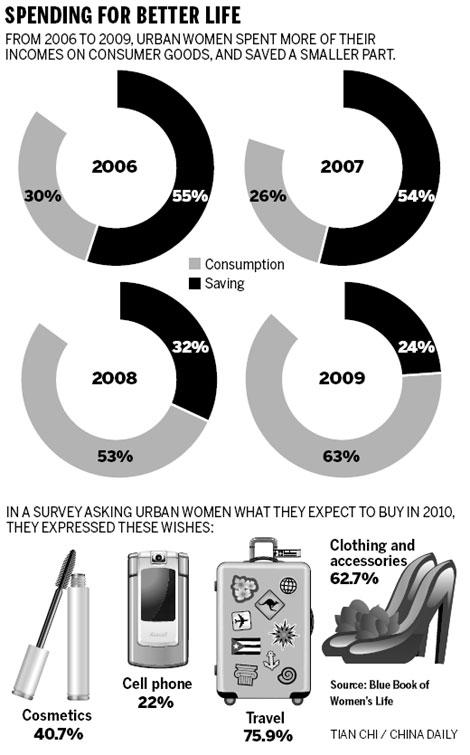BEIJING - Urban Chinese women are spending more and saving less as they poured 63 percent of their incomes into consumer goods ranging from clothes to cosmetics last year, a poll has found.
Also, women saved only 24 percent of their incomes last year, according to the survey released on Tuesday by the Women of China magazine.
By contrast, in 2006, urban Chinese women spent only 30 percent of their incomes on consumer goods and saved 55 percent.
The survey showed that urban Chinese women put less money in their bank accounts and developed a growing passion for spending, which is totally different from the patterns just a few years ago, said Liu Zhonglu, the organizer of the survey.
The survey, which polled 1,074 women in 10 big cities such as Beijing and Shanghai, found most of their spending went to clothing and apparel for the past four years.
Meanwhile, their spending on cosmetics, health-related goods, traveling and digital equipments has also grown sharply, according to the survey.

The respondents of the survey spent an average of 21,900 yuan ($3,220) on consumer goods last year.
"It is an inarguable truth that women decide consumption volume," said Han Xiangjing, head of the Women of China magazine.
A series of stimulus policies such as subsidizing the buying of domestic appliances have increased the purchasing power of women, Han said.
"Since Chinese women are playing a stronger role in household finances, they can spend more money improving their lives," Han said.
Liu said changes in consumption, especially the increase of online shopping, has also contributed to the growing consumption of urban Chinese women.
China's total retail sales of consumer goods in 2009 was 12.53 trillion yuan, with a year-on-year increase of 15.5 percent, according to statistics from the Ministry of Commerce.
A 26-year-old Beijinger, Lei Ying, said she generally spends 30 percent of her salary on shoes, clothes and accessories every month.
"I have decided to spend more to ensure my living quality," Lei said.
In the survey, 6.3 percent said the financial crisis has impacted their quality of life, 44.2 percent said the influence was not that bad, and 18.7 percent said the impact was slight.
However, nearly 37 percent said they would not change their buying habits due to the fluctuating economic environment, and 6.8 percent said they should buy more to resist inflation.
"Women are the decision makers of their family's consumption. And they set the trends in fashion as well. Therefore, the consumption of women is crucial to the expansion of domestic demand," said Huang Qingyi, former vice-president of the All-China Women's Federation.





